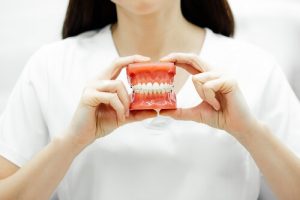Adapting to new dentures to replace missing teeth can often lead to unexpected challenges, including a noticeable lisping when speaking. This common issue arises as individuals adjust to the feel and fit of their new dental appliances, potentially impacting their speech clarity and confidence. How to fix lisping caused by dentures becomes a crucial question for many seeking to regain their natural speaking patterns. This article delves into the reasons behind denture-induced lisping and offers a range of solutions, from simple adjustments to professional interventions aimed at restoring clear communication.
Understanding Lisping from Dentures
Lisping, a speech issue characterized by difficulty pronouncing certain sounds, especially “s” and “z,” are speech problems that can arise as individuals adjust to the presence of dentures in their mouth. This adjustment period is a common experience for many transitioning to dentures after tooth loss, impacting their speech clarity and confidence.
Adjustment Period
New denture wearers may initially find that their appliances feel unfamiliar or bulky, which can affect how the tongue moves to form words.
Tongue Placement
The tongue may struggle to find its new position in the dentures, leading to mispronunciations and a temporary lisping effect.
Practice Makes Perfect
Engaging in exercises such as reading aloud, practicing speaking slowly, and using tongue twisters can help the mouth adapt to dentures and improve speech clarity.
Denture Fit and Comfort
Properly fitted dentures are crucial for minimizing speech issues. Ill-fitting dentures can exacerbate lisping, highlighting the importance of regular dental check-ups for adjustments.
Patience and Persistence
Overcoming lisping requires patience and persistent practice. With time, most denture wearers find their speech returns to normal as they become accustomed to their new smile.
Identifying the Cause: Why Dentures Can Affect Speech
Identifying the cause of why dentures can affect speech is essential for new denture wearers to understand and adapt to their new dental appliances. Recognizing these causes is the first step towards adjusting to your new dentures and restoring clear communication.
Physical Presence of Dentures
Introducing dentures changes the mouth’s physical space, affecting tongue placement and movement, which are crucial for articulating sounds.
Fit and Stability
Poorly fitted or unstable dentures can move during the speech, causing unexpected trouble pronouncing some letters and making it difficult to talk clearly.
Muscle Adaptation
The muscles in the mouth and jaw may need time to adapt to the presence of dentures. This adaptation can affect how sounds are formed, leading to temporary lisping or slurring.
Changes in Saliva Production
Some denture wearers experience increased saliva production when they first begin wearing dentures, which can interfere with speech until the body adjusts.
Practical Tips for Adjusting to Dentures and Reducing Lisping



By employing specific tips and techniques, individuals can significantly improve their comfort with dentures and minimize speech difficulties, particularly lisping, which often concerns “s” and “z” sounds.
Speech Exercises: Regularly practicing speech exercises, such as reading aloud and repeating challenging words or phrases, can help the tongue and mouth muscles adapt more quickly to dentures.
Slow Down: Practice speaking slowly, as this allows better control over denture movement and pronunciation, reducing the likelihood of lisping and improving overall speech clarity.
Use Adhesives: For those experiencing denture slippage, denture adhesive can provide additional stability, ensuring that dentures stay in place during speech.
Stay Hydrated: Adequate hydration can reduce excess saliva production, a common issue for new denture wearers, and can impact speech.
Seek Professional Adjustments: If lisping persists, consulting with a dental professional for denture adjustments can ensure a better fit, which is crucial for comfortable speaking.
Professional Solutions: When to Seek Dental Adjustments



Understanding when to seek these adjustments is essential for maintaining oral health and denture wearers’ overall quality of life.
Persistent Discomfort or Sore Spots: If discomfort continues despite giving the patient or yourself time to adjust, or if sore spots develop, professional adjustment is necessary to prevent further irritation and potential oral health issues.
Denture Slippage: Slippage during eating or speaking is a sign that dentures or teeth may not fit properly. Dentists at Parramatta Green Dental can adjust the fit to reduce movement and improve stability.
Changes in Speech: If lisping or other speech difficulties do not improve with practice, the dentures may need to be adjusted for better alignment and support in forming sounds correctly.
Difficulty Eating: Struggling to chew food comfortably with dentures indicates that adjustments may be needed to correct or improve bite alignment and functionality.
Regular Maintenance: Even without immediate problems, regular check-ups ensure dentures remain in good condition and continue to fit well over time.
References
A Contemporary Review of Clinical Factors Involved in Speech-Perspectives from a Prosthodontist Point of View
https://www.mdpi.com/1648-9144/59/7/1322
Adult Speech Impairment: Types, Causes, and Treatment
https://www.healthline.com/health/speech-impairment-adult
Lisps: What They Are and How to Deal With Them
https://www.webmd.com/children/what-is-a-lisp
The whistle and swish sound in denture patients
https://www.sciencedirect.com/science/article/pii/0022391367900285/pdf?md5=b31db8201423c3769b2c2b10a7e57ceb&pid=1-s2.0-0022391367900285-main.pdf
Dentures (false teeth) – NHS
https://www.nhs.uk/conditions/dentures/#:~:text=Dentures%20are%20removable%20false%20teeth,potential%20problems%20caused%20by%20gaps.

